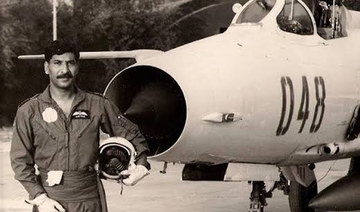HAIFA: Members of Israel’s Arab minority fear they will bear the brunt of the hard-right government’s judicial overhaul, but have remained largely on the margins of a raging debate over the sweeping changes.
Israelis have rallied weekly since the controversial reform package was announced in January by Prime Minister Benjamin Netanyahu’s ruling coalition, dubbed “the worst ever” by Samira Kanaan Khalaylah, 57, who lives in the northern Arab town of Majd Al-Krum.
Arab or Palestinian citizens of Israel, who make up around 20 percent of the population, are already “on the sidelines” of Israeli society and politics, said Khalaylah, a school secretary.
Moves by the coalition — which includes extreme-right leaders with a history of anti-Arab rhetoric — to restrict judicial oversight of government decisions and to weaken watchdogs “will be very bad for us,” she said.
Israeli protesters have staged mass demonstrations against the government’s legislative agenda they view as a threat to democracy.
But Arabs have been largely absent from these rallies, often heavy with Israeli flags which some find alienating.
They have organized their own rallies calling for equality.
The broader protest movement has been spearheaded by activists and army reservists largely unwilling to highlight messages relating to the plight of the Arab minority or of Palestinians, fearing it would harm their cause in the eyes of Israel’s Jewish majority.
In the northern city of Haifa, Arab demonstrators have rallied in relatively small numbers, carrying banners against the legal overhaul and demanding rights.
Yousef Jabareen, a lawyer and former lawmaker, said the proposals might hand the government “authoritarian powers” which threaten Arab citizens and their elected representatives.
With limited oversight, “the right wing will have ... broader powers,” said Jabareen.
The first key clause of the reform package passed through parliament on July 24, amending the “reasonableness” clause which was used by the Supreme Court to overturn government decisions deemed unconstitutional.
The court is set to hear petitions against the legal change in September.
Other proposals include handing the government a greater say in the appointment of judges and downgrading the status of legal advisers attached to ministries.
Netanyahu’s government which took office late last year has been set on expanding settlements in annexed east Jerusalem and the occupied West Bank, both seized in the Six-Day War of 1967.
“The extreme right wants to get rid of” the few objections “presented by the Supreme Court against settlement projects,” Jabareen said.
Leah Tsemel, a lawyer who has represented many Palestinians in Israeli courts, said multiple rulings have failed to protect minority rights even before the “reasonableness” amendment.
The Supreme Court has upheld the 2018 Nation State Law which enshrined Israel’s primary status as a state for Jews and downgraded Arabic as an official language.
The court has also signed off on handing east Jerusalem properties to settler organizations who hold deeds proving past Jewish ownership, prompting the eviction of Palestinian residents.
Tsemel noted the court had failed to recognize Palestinians’ ownership claims over properties in west Jerusalem.
The court has ruled “in favor of the state or settlement associations, and ignored the ‘reasonableness’ argument,” she said.
Studies by leading rights groups have concluded that Israel’s legal system and policies amount to apartheid, which Israel denies.
The Haifa-based Mossawa Center advocacy group has warned the judicial overhaul will only worsen “the rights violations of the Arab minority” and further the occupation of Palestinian territories.
Despite widespread reservations concerning Israel’s legal system, there had been “hope in Palestinian society that the court will intervene in unreasonable government decisions,” said Mossawa’s director, Jafar Farah.
He said the erosion of the court’s powers will “deepen institutional corruption,” affecting both Arab and Jewish Israelis.
But the minority wields far less political power, with an independent Arab party only once being part of a coalition government, in 2021-22.
With parliament now in recess until Oct. 15, Netanyahu has said the door remains open for talks with his detractors.
But after his allies pressed ahead with the July vote — which opposition lawmakers boycotted — protesters have vowed to stay on the streets as hopes for a compromise fade.



























